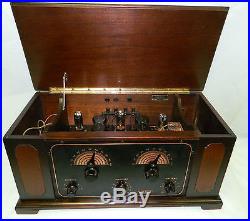
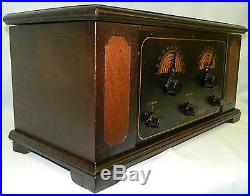

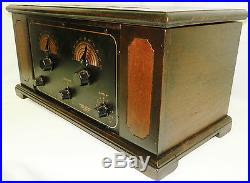
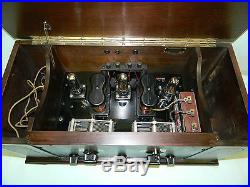

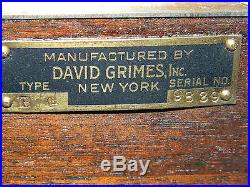

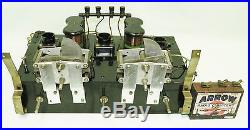
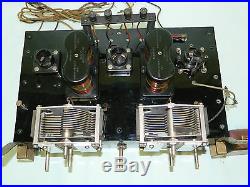
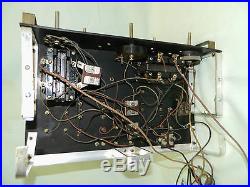
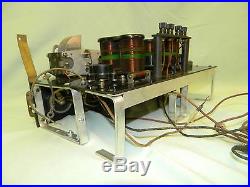
For your consideration is this gorgeous 1924 radio manufactured by David Grimes, Inc. New York City, NY. The radio is a called a inverse reflex using three tubes but doing the work of five tubes. David Grimes received a patent in 1922 for this circuit and started manufacturing radios in 1924. In David Grimes Inverse Duplex, the RF signals are feed through the first few stages of amplification as in the standard reflex, detected but then are fed through the RF stages in the reverse order as audio and then from the first RF stage to the audio output stage to the speaker. His claim was that the regular reflex circuits of the time were unstable and that his circuit cured that problem. He had made a few models some using as many as five tubes, but still using his inverse duplex design. By 1928 his company closed. In 1930 David Grimes worked for RCA and then by 1934 with Philco. By 1939 he was Philco’s chief engineer and then in 1942 became the VP in charge of engineering at Philco. Unfortunately, in September of 1943 while on a secret military mission, he lost his life in an aircraft crash in Londonderry, Ireland with six other radar experts. David Grimes from all accounts was a very brilliant engineer. This David Grimes “Baby Grand” uses three rare UV-199 tubes. The tubes were not tested but all have filament continuity. The cabinet had stripped and restored approximating the original color scheme. You’ll notice there are still some stains in the lighter portion on the top lid. The cabinet is solid mahogany and has compartments inside on both sides to hold the dry cell batteries. One of the rear legs was split in half and found inside the radio. It was removed and although only half it is large and won’t cause a stability problem. It was also glued to the cabinet bottom. There is also a “C” battery mounted on the right side with a date code of A28, possibly Jan 1928. When the bakelite chassis was removed almost all of the cast pot metal pieces were broken and rattling in the cabinet. He chassis legs and capacitor frame pieces were broken so, rather than gluing, it was decided to shape pieces close to the cast pieces out of flat stock aluminum. The new pieces are held in position with the same small bolts and nuts and the connection to the cabinet is made with the same three long bolts. Therefore, the look-in is the same as when the set was made. The broken cast parts will be included should like to assemble and use these for making exact castings. The bakelite chassis had warped because of the broken legs, so, it was carefully reformed flat (notice the aluminum angle piece running along the back edge) and then polished to a high brilliant shine. The large front dial is unique. It is a piece of copper plate which was sprayed black and then etched to reveal the shiny copper. The exposed copper lines and numbers were corroded and then polished to their original brilliance. All the electronic parts appear to be there and all are original. A test of the two audio transformers revealed that both had open windings. One the primary and the other the secondary. Information found on line suggested that a Hammond 124A audio transformer would work as a replacement, however it was decided to leave the original parts in tact. The grid leak label indicated that it should be a 4 megohm, but on testing it is close to 10 megohms. The tuning veneer on both air capacitors functions properly. All the other controls don’t appear to have any issues, although this radio as previously stated has not been tested. All the knobs are original and none have any problems. I’ve had this radio for some time and it was a basket a case, or rather a large box case. Only recently the box lid was opened and after looking up it’s history I was inspired by the David Grimes story, his service during WWI as a signal officer, his business endeavors and his unselfish contribution to the WWII war effort and tragic death. So this radio in almost museum condition is a tribute to him. If you like to collect rare and/or unusual radios then please consider this David Grimes “Baby Grand” Inverse Duplex. You may never come across one as nice as this one… Even if it is just a shelf Queen. The approximate dimensions are: 22 1/2″ long, 10 3/4″ tall and 10 1/2 deep. Thank you for looking. He US and Canada. The item “RARE VINTAGE ANTIQUE 1924 DAVID GRIMES BABY GRAND INVERSE DUPLEX RADIO With TUBES” is in sale since Thursday, August 06, 2015. This item is in the category “Collectibles\Radio, Phonograph, TV, Phone\Radios\Tube Radios\Pre-1930″. The seller is “autoprints” and is located in Manchester, New Hampshire. This item can be shipped to United States, to Canada.